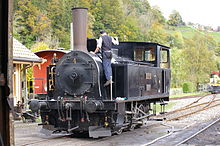SOB E 3/3
| SOB E 3/3 | |
|---|---|
| Numbering: | 1-11 |
| Number: | 11 |
| Manufacturer: | Esslingen, SLM |
| Year of construction (s): | 1878-1891 |
| Retirement: | 1940-1954 |
| Axis formula : | C. |
| Gauge : | 1435 mm ( standard gauge ) |
| Length over buffers: | 7800 mm |
| Total wheelbase: | 2500 mm |
| Empty mass: | 28.3 t (24.3 t No. 1–4) |
| Service mass: | 35.9 t (32.0 t No. 1–4) |
| Top speed: | 35 km / h |
| Indexed performance : | 350 hp |
| Driving wheel diameter: | 920 mm |
| Number of cylinders: | 2 |
| Cylinder diameter: | 380 mm |
| Piston stroke: | 530 mm |
| Boiler overpressure: | 12 atm. |
| Number of heating pipes: | 224 (236 No. 1-4) |
| Heating pipe length: | 2650 mm (2707 mm No. 1-4) |
| Grate area: | 1.5 m² |
| Radiant heating surface: | 6.6 m² |
| Evaporation heating surface: | 90.6 m² (97.8 m² No. 1-4) |
| Water supply: | 4.1 m³ (4 m³ No. 1-4) |
| Fuel supply: | 0.7 t (0.8 t No. 1-4) |
The Swiss Southeast Railway (SOB) owned a total of eleven type E 3/3 steam locomotives . The first four were still delivered to the Wädenswil-Einsiedeln-Bahn between 1878 and 1887 by the Esslingen machine works . The remaining seven locomotives were supplied by the Swiss Locomotive and Machine Works (SLM) in Winterthur in 1891. The purchase price was between 42,500 and 45,800 Swiss francs.
Technical
The locomotives were based on the Welti machines ( NOB Ed 2/2 ), but had a third axle instead of the roller wheel. While the dimensions of the wheels, the wheelbase and the steam pressure remained the same, a more powerful boiler was installed and the storage containers enlarged, so the errors found were rectified.
A reinforced frame was built into the locomotives replicated by the SLM, which led to an increase in weight, while the other dimensions and performance remained the same.
The first three locomotives received a second boiler between 1895 and 1895, which was identical to that of the number 5-11 and was supplied by the SLM.
The locomotive had a counter pressure brake, which, however, resulted in very high wear on the cylinders.
Operational

These eleven locomotives carried all rail traffic until 1910, when the two Ed 4/5 were delivered. With electrification they became superfluous. They were either scrapped or sold. The number 4 was erected as a memorial in 1976 in Wädenswil after it had worked as an industrial steam locomotive in the meantime. It was restored to working condition and put into operation by the Zürcher Oberland Steam Railway Association (DVZO) in 2007.
Up to five locomotives of this type had to be used on one train to transport a heavy pilgrimage. Therefore, locomotives from other railway companies sometimes had to be used in order to cope with the traffic.
literature
- Alfred Moser: The steam operation of the Swiss railways 1847-1966 . 4th updated edition, Birkhäuser, Stuttgart 1967. P. 289 ff.
- G.Oswald and K. Micher: Die Südostbahn, history of a private railway. Orell Füssli Publishing House. Zurich 1991. ISBN 3-280-02048-4 .
